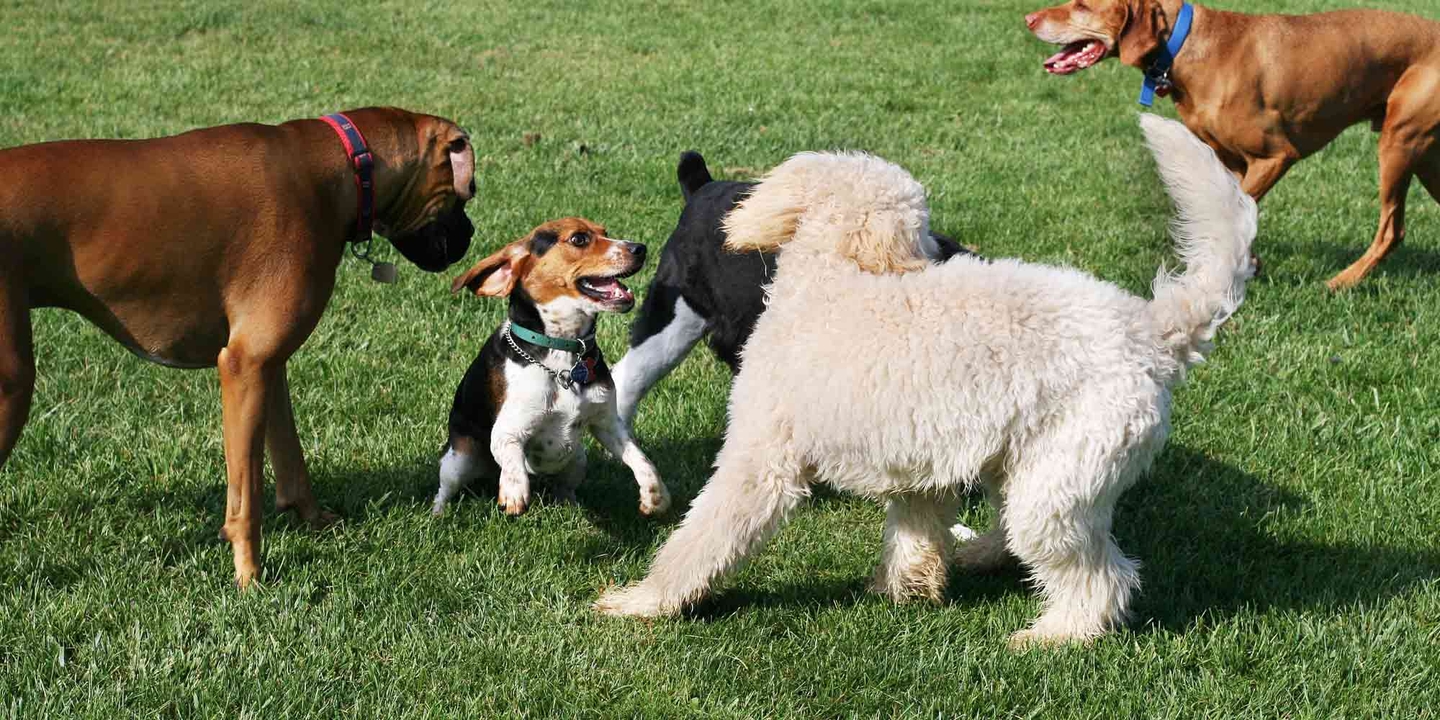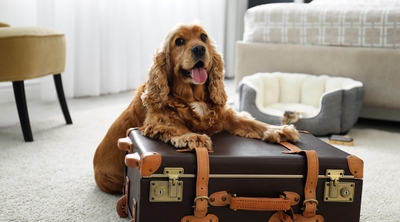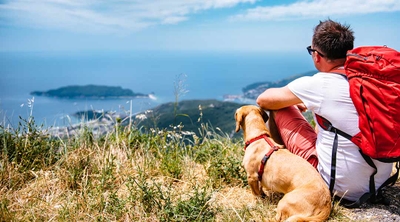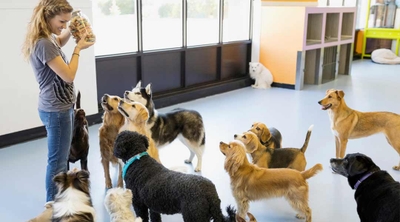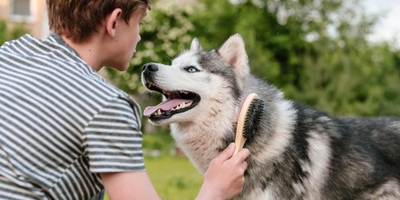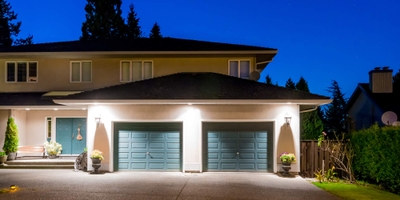Puppy socialization: How to raise a confident, well-behaved dog
5 min read
Well-socialized puppies tend to be happier and more confident than adult dogs. And proper puppy socialization doesn’t just help your puppy have a happier life — it can lead to a longer life, too. After all, the leading cause of death in dogs under the age of 3 is behavioral issues, not illnesses. So, if you want to ensure the best for your pup, prioritize puppy socialization from the get-go. But how early should you start socializing puppies? And how can you make sure your dog gets the best experience possible? This guide will help answer all those questions and more.
How early should puppy socialization begin?
When deciding when to socialize a puppy, remember: the sooner, the better. Successful puppy socialization starts during the first three and a half months of your puppy’s life. Socialization of puppies typically starts after they’ve been weaned and are eating solid food between 3 and 5 weeks of age.
Usually, this falls on the shoulders of the breeder to ensure proper human attention since puppies shouldn’t be adopted out and leave maternal care until 8 weeks of age. Research suggests separating a pup from its littermates and mother before that time can have a negative impact on future behavior.
This “golden period” between 4 and 14 weeks of age is when a pup’s neurological, sensory, and muscular development has progressed enough that they are very perceptive and curious. This is when they are less fearful, too, as startle responses and fear don’t usually start until the latter half of that golden period, peaking around 14 weeks. Unfortunately, dogs that haven’t experienced positive exposure to humans before the 14th week of age may be so poorly socialized that they may never make good pets.
“In my experience, when owners tell me their adopted dog’s behavioral issues stem from experiencing abuse earlier in life, usually it’s more closely related to a lack of good socialization at that crucial time in their early development,” said Dr. Fiona Lee, veterinarian, and Pets Best consultant.
Why is socializing so important in many different environments?
If you’re wondering how to socialize a puppy, remember that your pup needs to experience different people, animals, and environments. Of course, you won’t just be throwing him into these new situations; you’ll be taking things slowly as your puppy adjusts and ensuring the new experiences are positive.
Frequent and gentle handling during this period is beneficial and can help the pup build positive associations, which may influence his behavior for years to come. Unfortunately, traumatic, or fearful experiences during this period may also be firmly etched in the puppy’s memory.
“As a veterinarian, I can attest to the increased numbers of anxious and fearful pets we saw after the pandemic made adequate socialization impossible to do safely,” said Dr. Lee. “Many pet parents who chose to expand their fur families while they were stuck at home are now dealing with the fearful tendencies many of these dogs suffer from.”
So trying as many new experiences as possible is important while ensuring those experiences are positive. After all, the better socialized your puppy is, the better behaved and relaxed he will be as an adult dog when the unexpected happens. You’ll also be less likely to see him resorting to aggression when scared.
If you want to raise a confident dog, try these five tips for puppy socialization.
1. Make puppy socialization fun, but take it slow
Puppies are little balls of adorable energy. They love to play, so make socialization fun by being enthusiastic about new adventures. You can start as soon as you bring your puppy home. Slowly introduce her to the family. Let your puppy walk on different surfaces, like grass, carpet, wood, and tile.
“Bring treats to all these new experiences,” said Dr. Lee. “To prevent overfeeding during times you are relying heavily on treats for training, use the kibble you would have fed for a normal meal as a reward. In other words, make her work for her meals!”
Praise your pup every time she reacts positively, and try not to be anxious yourself since your puppy can pick up on your feelings.
Here are examples of experiences your puppy might have by the time she’s 12 weeks old:
- Meeting new people (young and old, men and women) and fully vaccinated dogs and cats (well-behaved adult animals, preferably)
- Seeing other animals, like squirrels or birds
- Seeing people wear different clothes, like coats, hoodies, hats, sunglasses, and masks
- Riding in cars and being around traffic (including bikes and strollers) while on a leash
- Walking on city sidewalks and country hiking trails
- Hearing noise from household appliances, like vacuums or the TV
Remember, you want to take new experiences when socializing a puppy slowly, so build on small steps. For example: Sit across the street from a dog park before coming closer (after she’s vaccinated).
2. Monitor for stress and fear
Whenever you’re introducing your puppy to a new experience, watch for stress or fear. If your puppy is calm, give him a treat. If he’s stressed, take a step back.
Some signs of stress or fear in puppies can include hiding, refusing treats, tucking their tail, putting their ears back, stiffening their body, averting their gaze, or avoiding touch.
3. Teach basic commands
Once you’re going outside, you’ll want your pup to know basic commands like “come,” “heel,” “sit,” and “stay.” While the exact steps for teaching each command vary, there are some basics to keep in mind. Puppies don’t understand punishment, but they love encouragement. Give your puppy her favorite treat and lots of praise when she does something right. Keep the training sessions short (10 minutes or less) and end on a positive note each time.
4. Join a puppy training class
A big part of socialization is joining puppy training classes since you’ll get personalized feedback, and your puppy can meet many other dogs his age. Each class has its requirements, but they typically start after your puppy begins his first vaccination series. Your veterinarian can suggest a good local trainer. If you’re not sure where to start, consider the six-week AKC S.T.A.R. Puppy Program, which ends with a test and a special certificate.
“Clients who enroll their dogs in puppy classes tend to feel more accountable for their pets’ behavior, which translates into them putting more time into adequate socialization,” said Dr. Lee.
5. Put safety first
Safety should be your top priority. Until your puppy is vaccinated, limit interactions with other dogs unless you know they’re also vaccinated or vetted by a puppy training class. Avoid dog parks until your puppy has her full vaccinations, around 17 weeks.
In the meantime, using a doggy stroller outside can avoid unintended interactions with unsafe dogs. You can also bring a pop-up tent for your puppy when you’re at a park or beach.
The bottom line: Puppy socialization is key
Proper puppy socialization is critical in the early months, but it should continue beyond three months. Dog Insurance can help you prepare for anything unexpected that may happen during these formative months. If you have concerns about your puppy’s socialization or behavior, consult a professional trainer or behaviorist. Pets Best policyholders can speak to a veterinary expert anytime through a 24/7 Pet Helpline.
Progressive Advantage Agency, Inc. (PAA) refers consumers to Pets Best Insurance Services LLC (Pets Best), which offers and administers pet insurance coverage underwritten by American Pet Insurance Company, a New York insurance company headquartered at 6100 4th Ave. S. Suite 200 Seattle, WA 98108, or Independence American Insurance Company, a Delaware insurance company located at 11333 N. Scottsdale Rd, Ste. 160, Scottsdale, AZ 85254. Pets Best (CA agency #0F37530) is a licensed insurance agency located at 10840 Ballantyne Commons Parkway, Charlotte, NC 28277. Each insurer has sole financial responsibility for its own products. Please refer to your declarations page to determine the underwriter for your policy. Terms and conditions apply. See your policy for details. Pets Best and the insurers are not affiliated with Progressive.
